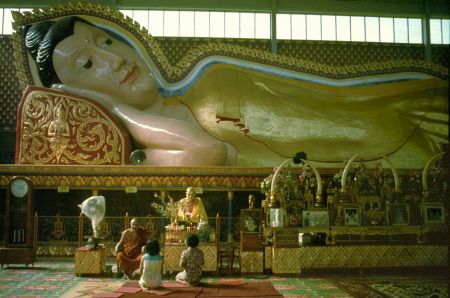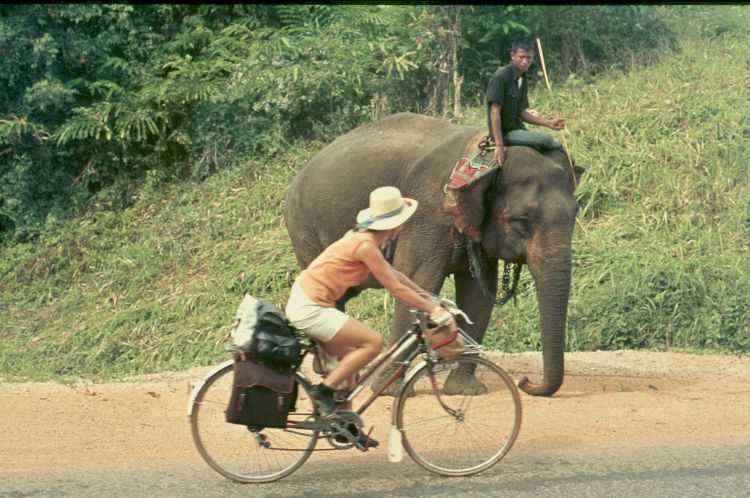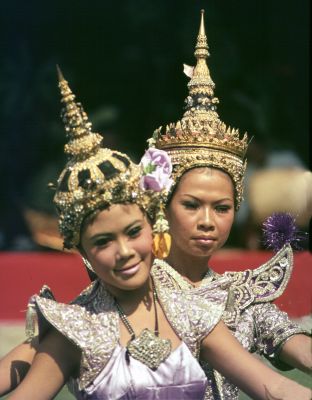| Barelds - Cycling around the world - Cycle stories - Asia, Africa, Europe, America | ||||||||||||||||||||
| home | site map | world | children | recent | cooking | dutch | german | react | ||||||||||||
South-East Asia 1968 (3).

Malaysia: Buddhist temple in Penang.
L
arge heaps on the road, announce some kind of animal, but chained, this animal shows the human interference with nature: a work elephant, good for dragging the heavy, precious trunks of tropical wood out of the forest. His boss is sitting on the head of the animal steering it with his legs behind the floppy ears. After work, the animal is parked next to his house: ridiculous proportion, the hut of the boss (owner) reaches only halfway the elephant's belly.Very early in the morning, while the monks, dressed in saffron gowns, are begging for their daily intake of rice, we try to ride in the cooler hours of the morning the first 30 km on a plate of rice milk.
"Do you feel yourself in a good condition", someone asks us when we take the first rest in a teahouse. "Yes why?", we ask. "The greatest climbing of southern Thailand lies before you, the pass to the west coast. I would take a bus". We immediately order some extra portions of food and fill the bottles with sweet tea. To climb 10 km at the hottest time of the day, that takes sweat, fortunately all the kilometres we have already cycled in Thailand, none of which was flat, have given us the necessary training. Arrived at the summit, we stop near a Buddhist sanctuary. Passing car or bus drivers greet it respectfully by hooting loudly and folding their hands, which, in our opinion, they had better keep them on the steering wheel, on this winding road.
A cooling tropical shower falls on our heads and as the Tai do, we look for a great banana leaf to serve as an umbrella.

Work elephant in Thailand: the first elephant that we passed by on our bicycles.
When we start the descent, we immediately slipped because of the oil, mud and rain, which make the steep descent very slippery and, as we are very wet, we even get cold.
An old, bent man, straightens up, and waves his stick "Pine, pine?" he shouts inquisitively(curiously) "Krung-Tep" - "Bangkok" , we are improving our Thai. "Ah" the old man sighs satisfied. Krung-Tep, Krung-Tep we heard everywhere, the information is spreading. The next village: "Pienai, pienai" etc. The words "Where to" we now know in many, many world languages

Thailand: Classical temple dances.
Although we insist, he refuses. In the newspapers we often read about such skirmishes so we resign to his advice.
Krung-Tep- so Bankok- is a chaos of far too few roads, full of far too many cars, so much more dangerous than all the tigers and snakes in the jungle. But after we had visited many embassies in order to get a visa for the following countries - Burma, Bangle Desh, (then East Pakistan) and India, you become adroit and we visited all the interesting temples by bicycle.
We also visited, by bicycle, Ayudha, the old capital, partly in ruins, dug out of the jungle, partly restored, but back to Bangkok, by boat for a change, the long narrow boats, which run in the wetland of the delta as a bus. The controller comes, and Henny shows the tickets. That is OK but he points at our bicycles. For these we have no tickets. Smiling Henny nods and points at ourself, these are ours. The man once again points at a ticket, Henny shows, smiling, our tickets again, the man points at the bicycle again. Henny, smiling again, these are ours. Who carries on with the smiling. We or the people who taught us this technique. The controller moves on shaking his head about so much stupidity.
| World around (nl) | South-East Asia | << Previous | Next page >> | |||
| Barelds on bicycle through the world - Cycling in Asia, Europe, Africa, America | ||||||